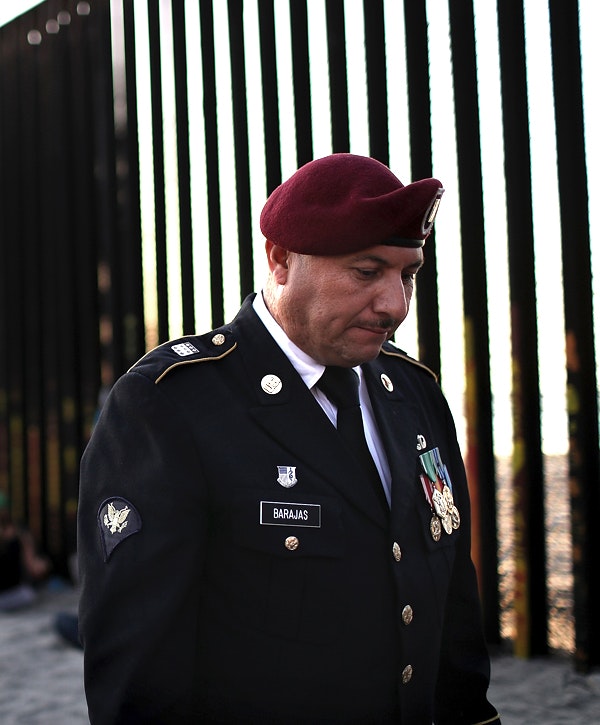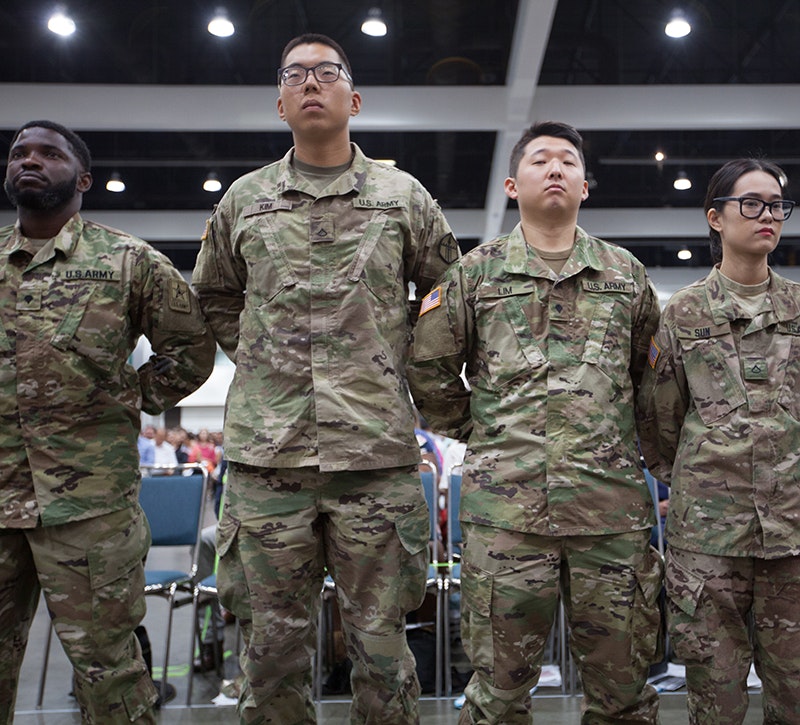Immigrant veterans who proudly served in the United States military have been deported despite their service, devastating their families and dishonoring their patriotism. Representatives Vicente Gonzalez (D-TX) and Don Young (R-AK) have re-introduced the bipartisan "Repatriate Our Patriots Act" (H.R. 4382) to stop the deportation of immigrant veterans and allow veterans who have already been deported to return home.
Priority Bill Spotlight:
The Repatriate Our Patriots Act


“It is unconscionable that immigrants who have fought and sacrificed to preserve America’s freedom should be banished from the very country they enlisted to defend.”
The Repatriate Our Patriots Act would address deportation of immigrant veterans
Immigrants have served in the United States Armed Forces since the founding of our country, and the long-standing policy allowing immigrants to earn U.S. citizenship through military service has strengthened our military. Unfortunately, many immigrant veterans never become citizens, and are left vulnerable to the consequences of a broken immigration system.1
In fact, many immigrant veterans have been deported from the United States,2 devastating their families and sending their lives into turmoil. The Government Accountability Office (GAO) has identified at least 250 veterans who were placed in removal proceedings or deported between 2013 and 2018; the total number of veterans who have been deported is likely much higher.3
It is unconscionable that immigrants who have fought and sacrificed to preserve America’s freedom should be banished from the very country they enlisted to defend. Their service should be specially recognized in immigration matters.4
The Repatriate Our Patriots Act (H.R. 4382) would protect immigrant veterans who served honorably from being deported, and allow previously deported veterans to return to the U.S. with a lawful immigration status.
“Under this bill, veterans who had been deported would be allowed to re-enter the U.S. as legal permanent residents”
Prohibiting the deportation of 'special veterans'
The central focus of this bill is to prevent the deportation of immigrant veterans. Under current law, any immigrant veteran who is not a citizen can be placed in removal proceedings. Their military service is not considered as a factor in the decision to order their deportation, and they are not provided access to government-funded legal defense.5
The Repatriate Our Patriots Act defines a new category of “special veterans,” generally immigrants who have served in the U.S. military, were honorably discharged, and have not been convicted of offenses like voluntary manslaughter, rape, sexual abuse, child abuse, or terrorism-related charges.
The bill requires the Secretary of Homeland Security to identify special veterans, either by inquiring about military service prior to starting the deportation process, or retroactively, by reviewing records of individuals previously detained or deported.6
Under this bill, individuals who meet the definition of “special veteran” would not be deported, and special veterans already in removal proceedings would have those proceedings canceled.
Allowing previously removed veterans to return to the U.S.
Many immigrant veterans have already been deported and are living outside the U.S., with no legal option to return.
These deportations force the separation of families, including U.S. citizen spouses and children, and impose significant financial and psychological hardships. Once deported, veterans are often prevented from accessing the VA benefits they earned through their service.
Under this bill, veterans who had been deported would be allowed to re-enter the U.S. as legal permanent residents.
“Increasing naturalizations for immigrant service members is the most effective way to protect veterans from deportation...”
Rapid naturalization for immigrant veterans
Increasing naturalizations for immigrant service members is the most effective way to protect veterans from deportation; once naturalized as citizens, immigrants are no longer subject to immigration enforcement. Unfortunately, many immigrant veterans do not complete the process, even though their service makes them eligible.7
In fact, naturalizations for immigrant service members have declined in recent years, in part because of restrictive new policies and growing backlogs that keep applicants waiting years, exposing them to the risk of deportation in the meantime. And in recent years, service members’ citizenship applications have been denied at higher rates than applications by civilians.8
The Repatriate Our Patriots Act would make any immigrant who meets the “special veteran” definition become immediately eligible for naturalization, and would require the Secretary of Homeland Security to ensure that immigrant veterans do not have to wait longer than 90 days after applying to be naturalized. The bill also allows immigrant veterans outside of the country to apply for and receive naturalization from a U.S. consulate or embassy.
“87% of current servicemembers and veterans agreed that individuals who serve in the military, and their spouses and children, should be protected from deportation.”Poll conducted by Smithsonian and Stars and Stripes
Congress should pass the Repatriate Our Patriots Act
Immigrant veterans have risked everything to defend the United States, and Congress should ensure that they are welcomed and protected in the country they call home.
This is a bipartisan issue, and enjoys broad support—according to a poll conducted by Smithsonian and Stars and Stripes, 87% of current service members and veterans agreed that individuals who serve in the military, and their spouses and children, should be protected from deportation.
FWD.us supports the Repatriate our Patriots Act, and we urge Congress to pass legislation to protect veterans from deportation and facilitate their naturalization.
Get in touch with us:
Andrew Moriarty
Deputy Director of Federal Policy
Footnotes
- The Migration Policy Institute (MPI) estimates that 83% of foreign-born veterans (436,000) were naturalized citizens in 2018, leaving roughly 89,000 immigrant veterans who had not yet naturalized. MPI, "Immigrant Veterans in the United States," https://www.migrationpolicy.org/article/immigrant-veterans-united-states-2018.
- Before the passage of the Illegal Immigration Reform and Immigrant Responsibility Act of 1996, the removal of noncitizens from the United States was referred to as “deportation.” While this term is no longer used in statute, it is still the most commonly and easily understood term; in this piece, we use “deportation” and “removal” interchangeably. For more, see https://www.uscis.gov/tools/glossary#:~:text=Deportation
- Because the government does not publish data on the military service histories of immigrants who were deported, estimating the total number of veterans who have been deported is quite difficult; some advocates believe thousands of veterans have been deported and are living today outside the U.S. For example, see reporting from Joanna S. Kao such as "Deported Vets: Life in ‘the bunker,’" Al Jazeera America, http://projects.aljazeera.com/2014/deported-veterans.
- Congressional action is needed to ensure that veterans are protected from deportation and able to naturalize as citizens; the President and federal agencies cannot fully address the issue alone. For example, U.S. Citizenship and Immigration Services (USCIS) has recognized the contributions of immigrant veterans and has previously been able to provide limited administrative protections such as deferred action or parole in place; but without congressional action, USCIS does not have the authority to naturalize immigrant veterans if they don’t qualify under current law.
- Military service was previously considered as a positive factor in removal proceedings, but the Illegal Immigration Reform and Immigrant Responsibility Act, signed by President Bill Clinton in 1996, ended that practice. Bill text available at https://www.law.cornell.edu/wex/illegal_immigration_reform_and_immigration_responsibility_act.
- This practice should, in theory, already be happening; Immigrations and Customs Enforcement (ICE) officers are required to document information about service history and receive management approval before initiating removal proceedings against immigrant veterans. However, a GAO investigation found that “ICE does not consistently follow these policies,” and that “some veterans who were deported may not have received the level of review and approval that ICE has determined is appropriate for cases involving veterans. GAO, "Actions Needed to Better Handle, Identify, and Track Cases Involving Veterans," https://www.gao.gov/products/GAO-19-416.
- Some veterans who were deported report that they actually believed they were already citizens, because of misunderstandings about the process or misleading information from military officials and recruiters. American Civil Liberties Union (ACLU), ""Discharged then Discarded: How U.S. veterans are banished by the country they swore to protect," https://www.aclusandiego.org/wp-content/uploads/2017/06/DischargedThenDiscarded-ACLUofCA.pdf.
- A report from the ACLU found that military naturalization applications are often denied because immigration officers determine a criminal history precludes service members from meeting the “good moral character” requirement, or because the service member does not complete the process in time, perhaps because they are deployed overseas. ACLU, "Discharged then Discarded: How U.S. veterans are banished by the country they swore to protect," https://www.aclusandiego.org/wp-content/uploads/2017/06/DischargedThenDiscarded-ACLUofCA.pdf. See also Joanna S. Kao, "Good enough to fight for the US but missing the mark for citizenship," Al Jazeera America, http://america.aljazeera.com/multimedia/2015/5/good-enough-to-be-soldier-but-not-citizen.html.
Tell the world; share this article via...
Get Involved
We need your help to move America forward. Learn what you can do.




